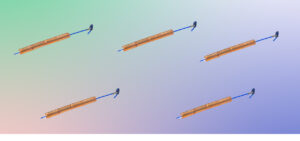
✅ If you think you’ll find this blog interesting, make sure to check out our newsletter for more:
What’s the lowdown?
- It’s unlikely your partner will be affected by your coil during sex
- If your partner says they feel something different, it’s likely the strings of your coil but these are extremely unlikely to cause pain
- If they cause discomfort, try wearing a condom until they naturally soften over time
- If the discomfort continues, get in touch with your GP to discuss shortening your coil strings
So your partner claims they can feel your coil during sex. You may be tempted to freak out, and we understand. Our bodies are complex, finding reliable information on the internet can be confusing, and not every woman is comfortable getting deep with their provider during a face-to-face appointment.
But don’t panic! The Lowdown has got your back. We do all the dirty work (research, polls, etc.), and all you have to do is read on.
Remind me how the coil/IUS/IUD works?
A coil or IUD is a small, t-shaped piece of plastic device that is inserted into your uterus by a medical professional.
The hormonal coil/IUD (previously known as an IUS) gradually releases the hormone progestogen. This hormone prevents pregnancy by stopping the release of an egg every month, thickening the cervical fluid and making it more difficult for sperm to enter and fertilize an egg, along with keeping the lining of the uterus thin to prevent the implantation of a fertilised egg.
The copper coil (aka IUD) contains no hormones and, instead, has a copper wire wrapped around the plastic device. This prevents pregnancy by decreasing the motility of the sperm and stopping the sperm and egg from meeting.
The coils are popular choices of contraception. They are both low maintenance and over 99% effective in preventing pregnancy. After insertion, an IUD can remain in place for 3-10 years, depending on the type or brand. After this time it can simply be removed and replaced with a new one by a healthcare professional.
Feeling the coil during sex
Your partner will, most likely, not be affected by your coil during sex. If your partner does claim to feel something new during sex, they are most likely feeling the threads of your coil, not the device itself. For removal purposes, the coils have short strings that hang down 3-4 cm through the neck of the uterus (the cervix) into the vaginal canal.
While it is entirely possible to feel these strings, it is more likely than not your partner won’t feel anything at all. A Lowdown poll of 744 users determined that 28% of partners have felt the coil during sex, while 72% of partners have not.
The threads are also usually made of thin, flexible plastic and it is extremely unlikely they will cause any pain or discomfort to your partner. A study in 2017 determined that only 3-9% of partners have experienced enough discomfort from the coil strings to cause them to discontinue sex. The threads may tickle or occasionally nudge the tip of a penis, especially soon after insertion. However, the threads tend to soften over time reducing this feeling.
These IUD threads are actually beneficial. Along with aiding in the removal process, they can be helpful in determining if the device is in place, and the medical professional who performed the insertion should teach you how to occasionally feel for these strings. While string checks are not necessary for safe and effective use of the coil, most prescribing information from the companies of these devices instructs providers to counsel women on checking their coil strings and to make an appointment with their doctor or nurse if the strings are continuously unable to be felt, and use condoms or another method in the meantime.
Very occasionally the threads get lost. This is more commonly caused by the threads being pulled up inside into the cervix. They may notice this when you go to have the coil removed, and sometimes the threads can reappear naturally. Don’t hesitate to reach out to your care provider or make an appointment if you feel your threads are out of place or have disappeared.
If your partner feels a harder, more uncomfortable sensation like a matchstick against the tip of the penis, this may need checking out as it could represent movement of the coil.
Can the coil fall out during sex?
This is another common concern about how an IUD may impact your sexual wellbeing. It is important to understand that your coil is placed inside your uterus, rather than at the top of your vagina, so it is very unlikely to fall out during sex.
However, sometimes an IUD can fall out, be pushed out of the uterus, or move. This is termed expulsion and happens to 1 in 20 users but is most common in the first few weeks after getting the coil fitted or during a period. Sex is not necessarily a risk factor for the expulsion of your coil and is not something to worry about. Read more common questions about coil fittings in our blog here or check out our stories over on Instagram.
You may not know your coil has fallen out, which is why it is important to check your coil threads regularly. You should make an appointment with your provider if your coil strings feel longer, shorter, or if you or your partner feels the actual device. Remember to use condoms or avoid sex until then.
How else can the coil affect my sex life?
Chances are the coil will not physically affect sex with your partner. However, contraception can have a different effect on every woman and may cause more changes in some women than others.
According to some of our reviews on the IUS and IUD, both vaginal dryness and low libido may be a side effect, which may affect your comfort during sex or the desire to even have sex. However, these possible side effects were reported by only a small percentage of women who reviewed these contraception methods on our website.
Read our users’ reviews of the IUS and the IUD.
So, what’s the moral of the story?
Do not panic if your partner claims they can feel your coil during sex! There is nothing to be afraid of; lots of women report their partners being able to feel the strings to their coil initially and this tends to lessen over time.
If the strings are impacting sex with your partner, you can speak to your doctor or nurse, as sometimes these strings can be cut shorter. However, the chance your coil will physically affect your sex life with your partner is low, and the benefits of a highly effective, low-maintenance method may outweigh any cons.
Importantly, if sex begins to hurt for you or for your partner, or you are worried your coil has become dislodged, avoid sex or use condoms and make an appointment with your doctor or nurse to make sure everything is a-okay.
Tags
- coil, Erin Damico, IUD, IUS, sex
- NHS. Intrauterine system (IUS).
- Melo, J., Tschann, M., Soon, R., Kuwahara, M. and Kaneshiro, B., 2017. Women’s willingness and ability to feel the strings of their intrauterine device. International Journal of Gynecology & Obstetrics, 137(3), pp.309-313.
Erin is an Associate Account Executive at BGB Group in New York City. She studied in London and has her MSc in Clinical and Public Health Nutrition from UCL. She has a particular passion for using nutrition for disease prevention, as well as women’s health.
You can find Erin on LinkedIn here.











